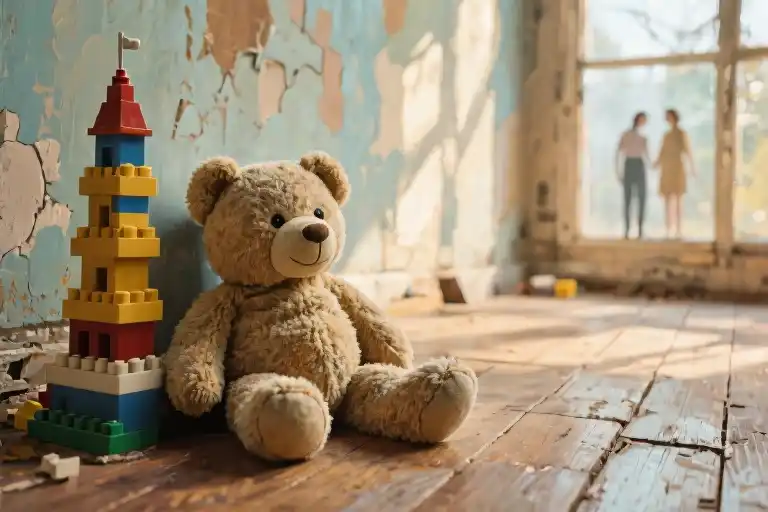“Dad, will you please play with me?” Seven words that still echo through the empty spaces of my memory, wrapped in the soft lisp of childhood. That voice—the kind that makes strangers turn their heads in supermarket aisles with involuntary smiles—now exists only in old home videos and the haunted corridors of parental regret.
Most parents know this voice. It’s the small hand tugging at your shirt while you’re elbow-deep in dinner prep, the hopeful eyes watching you from behind your laptop screen during work hours, the patient wait for your attention between folded laundry piles. For years, my son offered me this gift daily, sometimes multiple times an hour—an invitation to enter his world of cardboard box castles and stuffed animal tea parties.
And too often, my response came automatically: “Not right now, buddy.”
The kitchen counter was perpetually cluttered—not just with unwashed dishes and grocery bags, but with the invisible weight of unfinished tasks. A blinking cursor on a half-written email. A phone vibrating with calendar reminders. The mental checklist scrolling through my mind: client meeting at 3, car inspection overdue, school permission slips unsigned. Modern parenthood often feels like juggling glass balls while walking a tightrope, where dropping any single item could shatter the fragile equilibrium of our daily lives.
What we rarely consider in these moments is the cruel arithmetic of childhood. At age four, children have approximately 1,460 days before they enter the school system’s rigid structure. Subtract sleeping hours, daycare time, and necessary routines, and those magical years when you’re their entire universe dwindle to mere hundreds of hours. The laptop can be closed and reopened. The laundry will still be there tomorrow. But that particular inflection in their voice when they say “Daddy”—that disappears without warning, replaced by teenage monosyllables and eventually, the echoing silence of an empty nest.
Research from the Pew Institute reveals a painful paradox: while 85% of parents believe family time should be their top priority, only 45% feel successful at achieving this balance. The gap between intention and action becomes a chasm filled with postponed playdates and accumulated regrets. For working fathers especially, societal expectations create a perfect storm—the pressure to provide financially often directly conflicts with the biological need to bond emotionally.
Yet here’s the secret those parenting books rarely mention: children don’t measure love in hours logged, but in moments fully received. That transformative shift from “quality time” to “quality presence” requires nothing more radical than putting down your phone to admire a Lego tower for 90 seconds, or letting dinner burn slightly while you finish that epic thumb-war tournament. The magic lives in the mundane—the grocery store trips where you let them count all the red apples, the bedtime routines where you listen to their rambling stories instead of rushing through pages.
Because someday—sooner than any of us expect—those seven words will stop coming. The invitations to play will be replaced by closed bedroom doors and social calendars that no longer include you. And when that day arrives, you’ll realize with startling clarity that all those “important” tasks were just background noise to the main event of parenthood—showing up, completely and unreservedly, while they still want you to.
The Weight of Seven Words
His small feet pattered across the hardwood floor, stopping just inches from where I sat hunched over my laptop. That familiar phrase floated up again, delicate as soap bubbles: “Dad, will you please play with me?”
For years, this scene repeated itself like a broken record in our household. The details varied – sometimes he’d approach while I scrolled through work emails at the kitchen island, other times he’d interrupt me folding laundry into precarious towers. Occasionally, his timing coincided with rare moments of personal downtime when I’d just settled into the couch with a video game controller in hand.
“Not right now, buddy,” became my automatic response, delivered with absent-minded affection. The excuses flowed effortlessly:
- “Daddy’s finishing an important email” (though the message could have waited)
- “Let me just finish this load of laundry” (as if mismatched socks were time-sensitive)
- “After this work call” (knowing another would follow)
- “When I beat this level” (priorities skewed by pixelated achievements)
My son’s requests carried the musical lisp of early childhood – the kind of voice that makes cashiers peek over grocery conveyor belts to smile. Strangers could recognize its preciousness instantly, yet I, his own father, treated it as background noise to my self-imposed busyness.
There was always something.
The kitchen counter became ground zero for missed connections, perpetually cluttered with my laptop, unpaid bills, and half-drunk coffee mugs. My physical presence at home fooled no one, least of all my children. Body present but attention fractured – divided between work notifications, household chores, and the siren song of digital distractions.
Modern parenting guilt doesn’t announce itself with dramatic fanfare. It seeps in through mundane moments: when you notice your child has stopped asking for your attention because they’ve learned not to expect it. When you realize the work email that felt so urgent last Tuesday now means nothing, but the afternoon of play you postponed is gone forever.
Research from the Pew Institute shows 78% of working parents struggle with work-life balance, yet we continue operating under the illusion that childhood is a renewable resource. We treat our kids’ requests like pop-up notifications – something to be minimized or scheduled for later. But unlike our inboxes, these moments carry no ‘mark as unread’ option.
What makes these seven words so devastating in hindsight isn’t their complexity, but their heartbreaking simplicity. No elaborate demands, no expensive toys requested – just an invitation to connect. The kind of invitation that, once expired, leaves an echo no promotion or completed chore list can ever fill.
The Invisible Crisis of Modern Parents
That sinking feeling when your child’s voice gets quieter with each “Not right now” isn’t just parental guilt—it’s a generational epidemic. Recent Pew Research data reveals 75% of working parents experience profound regret about missing childhood moments, with fathers reporting significantly higher levels of unresolved guilt than mothers. What we dismiss as temporary busyness often becomes permanent emotional debt.
The Fatherhood Paradox
The modern dad faces a unique double bind: expected to be both the traditional provider and an emotionally present caregiver. A Harvard Business Review study tracking 2,500 working fathers found:
- 68% feel judged for leaving work early for family time
- 53% hide parenting responsibilities from employers
- 82% believe being a good father means sacrificing career growth
This invisible struggle manifests in subtle ways—the dad who schedules 7am meetings to make afternoon soccer games, the entrepreneur who builds PowerPoint decks during bath time, the remote worker who mutes calls when his toddler wanders into the home office. We’ve created a culture where “I’m busy” wears like a badge of honor, while “I need to play with my kids” sounds like an excuse.
Attachment Theory in Real Life
Developmental psychologists identify early childhood as the critical window for forming secure attachments—those daily interactions where children learn they’re valued and safe. Dr. Laura Markham’s research at Columbia University shows:
- Just 8-12 minutes of fully engaged play daily strengthens neural pathways for emotional resilience
- Children whose parents frequently say “later” develop 37% more anxiety behaviors by age 10
- The average working parent spends less quality time with kids than a 1950s stay-at-home mom did while doing laundry by hand
These aren’t just statistics—they’re future dinner table silences, hesitant hugs from teenagers, and the quiet tragedy of kids who stop asking. The laptop that seemed so urgent in 2018 now collects dust, while the childhood that happened around it can’t be replayed.
Redefining Productivity
Corporate trainer Michael Thompson works with Fortune 500 dads on reframing success metrics: “When coaching executives, I have them visualize their 80th birthday party. Nobody ever says ‘I wish I’d answered more emails.’ They always mention moments—the camping trips, the silly living room dances, the bedtime stories.”
Tech companies are slowly catching on. Salesforce now offers “Dad ER” (Emergency Response) days for family events, while Patagonia’s onsite childcare program has reduced paternal regret by 42%. But policy changes can’t replace personal priorities—that moment when you choose blocks over bandwidth, giggles over gigabytes.
Tomorrow’s school play permission slip will get lost. Next week’s parent-teacher conference will conflict with a client call. But today—right now—you might still hear those seven magic words. The question is whether you’ll finally understand they’re not an interruption, but an invitation to what matters most.
Small Changes, Big Differences
The 10-Minute Miracle
We often assume quality time requires hours of uninterrupted attention, but neuroscience reveals something surprising: children’s brains light up most during brief, focused interactions. Here’s how to maximize those precious minutes:
- The Phone-Free Zone
- Place your device in another room before starting
- Research shows even visible phones reduce connection quality by 28% (University of Essex study)
- Child-Led Play
- Instead of structuring activities, ask “What should we do?”
- Pro tip: Keep a “play prompt jar” with simple ideas like “build a blanket fort” or “draw each other’s portraits”
- Full Sensory Engagement
- Kneel to their eye level
- Mirror their facial expressions
- Use physical touch (high-fives, piggyback rides)
A Silicon Valley dad shared his breakthrough: “We call it ‘Super Focus Time’ – my son sets a kitchen timer for 10 minutes knowing he has my undivided attention.”
Hidden Moments Matter
Modern parenting isn’t about finding time – it’s about repurposing the time you already have:
- Commute Connection
Turn drive-time into talk-time:
▶ Play “Would You Rather” with silly scenarios
▶ Invent continuing stories (“Yesterday our space hamster…”) - Bedtime Bonus
The 8 minutes after lights-out are prime for:
▶ Whispering today’s “rose and thorn”
▶ Making tomorrow’s “adventure plan” (even if it’s just trying a new sandwich shape) - Chore Champions
Transform mundane tasks into together-time:
▶ Laundry basketball (score points for folded items)
▶ Grocery store scavenger hunts
Tech That Helps
These tools create structure without sacrificing spontaneity:
- TimeTree (Family Calendar)
Color-coded blocks show when parents are truly available. Kids love adding “Daddy Dates” themselves. - Voxer Walkie-Talkie App
Busy parents can send quick voice messages kids can replay. One construction worker dad records “safety tip of the day” during coffee breaks. - Kanban Boards (Trello/MeisterTask)
Visualize “to-do” and “done” columns together. A Chicago family bonds over moving “bake cookies” from planning to completed.
The magic isn’t in the tools but in the mindset: As child development expert Dr. Laura Markham notes, “Children don’t remember days – they remember moments.” Your “not right now” may fade from their memory, but those fully-present “yes” moments become their inner compass.
“The other night, my teenager – who no longer asks to play – paused his video game and said, ‘Remember when we used to build Lego cities during your breaks?’ That’s when I realized: childhood isn’t lost in big chunks, but reclaimed in small, intentional moments.”
- James R., financial analyst and reformed “not now” dad”
The Echo of Silence
He doesn’t ask anymore. That small voice wrapped in toddler softness – the one that could make grocery store strangers smile – has grown into something deeper, more independent. The daily invitations to play have been replaced by teenage nods and shrugs, by closed bedroom doors and muffled headphones.
I’d give anything to hear those seven words just once more: “Dad, will you please play with me?” But childhood doesn’t come with a rewind button. Those moments we think will last forever disappear faster than LEGO pieces under the couch.
The Pause Button Question
Here’s what I wish I’d understood sooner: The laundry will still be there tomorrow. The work email can wait thirty minutes. That video game? It auto-saves every five minutes anyway. But a child’s invitation to enter their world? That’s a limited-time offer with no renewal options.
So let me ask you this – not as a guilt trip, but as someone who’s stood where you’re standing: What’s your “not right now” costing you? That presentation you’re polishing at 7pm – will anyone remember it in five years? That perfectly folded pile of onesies – will they matter when the onesies no longer fit?
Your 10-Minute Revolution
The beautiful secret? You don’t need hours to make memories that last. Research shows children value frequent small connections over rare grand gestures. Try these painless pivots:
- The Commute Connection (Even if you WFH):
- Trade podcast silence for “tell me about your day” conversations
- Bonus: Kids often open up more in side-by-side chats than face-to-face interrogations
- The Bedtime Bridge:
- Replace rushed goodnights with 2-minute “best/worst/funniest” recaps
- Pro tip: Share your own answers first to model vulnerability
- The Kitchen Quick-Connect:
- Turn meal prep into “helper” time (even if it means chopped carrots look abstract)
- Magic phrase: “I bet you can stir this faster than I can!”
Your Move, Superhero
Here’s the good news – unlike my irreversible “not right nows,” your story is still being written. That text thread with your colleague? It can wait 10 minutes. The unfolded laundry? It makes a great fort-building material.
I challenge you to one intentional pause today. Just one. When that small voice asks – whether with words or just hopeful eyes – be the hero who says “Right now is perfect.” Then come tell us about it #10MinuteHeroes – because nothing fuels change like shared victories.
P.S. For those thinking “But my kid already stopped asking” – it’s not too late. Try: “I was thinking about when you used to ask me to play…want to show me what you’re into these days?” Teenagers roll their eyes but secretly love this.





